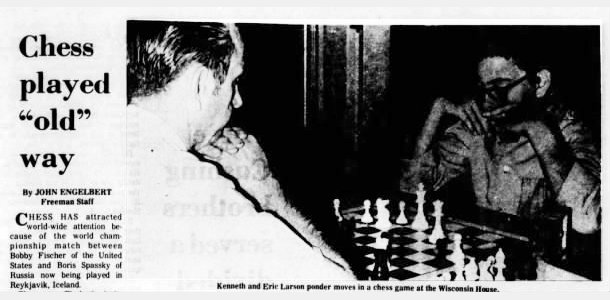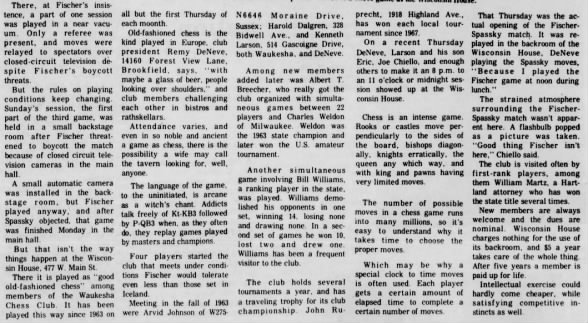Waukesha Daily Freeman Waukesha, Wisconsin Saturday, July 22, 1972 - Page 27
Chess Played 'Old' Way by John Engelbert, Freeman Staff
CHESS HAS attracted world-wide attention because of the world championship match between Bobby Fischer of the United States and Boris Spassky of Russian now being played in Reykjavik, Iceland.
There, at Fischer's insistence, a part of one session was played in a near vacuum. Only a referee was present, and moves were relayed to spectators over closed-circuit television ([as per, Fischer's expectations; silent, automatic, stationary closed-circuit cameras in contrast to large, bulky major sports television cameras operated by crews of men who interfere with concentration]).
But the rules on playing conditions ([were laid down in stone and Soviet-Icelandic organizers have broken the rules on numerous occasions]). Sunday's session, the first part of the third game, was held in a small backstage room after Fischer threatened to boycott the match because of ([large, bulky, disruptively human-operated television cameras]) in the main hall.
A small automatic camera was installed in the backstage room ([according to the expectations Fischer had to begin with; silent, automatic, stationary equipment]) and ([naturally]) Fischer played and after Spassky objected, that game was finished Monday in the main hall.
But that isn't the way things happen at the Wisconsin House, 477 W. Main Street ([and isn't actually how things happened in Reykjavik, Iceland, either, but neglectful journalism, pipelined from the remote, isolated match near the north pole, where even satellite communications are impossible.])
There it is played as “good old-fashioned chess” among members of the Waukesha Chess Club. It has been played this way since 1963 on all but the first Thursday of each month.
Old-fashioned chess is the kind played in Europe, club president Remy DeNeve, 14160 Forest View Lane, Brookfield, says “with maybe a glass of beer, people looking over their shoulders,” and club members challenging each other in bistros and rathskellars.
Attendance varies, and even in so noble and ancient a game as chess, there is the possibility a wife may call the tavern looking for, well, anyone.
The language of the game, to the uninitiated, is arcane as a witch's chant. Addict's talk freely of Kt-KB3 followed by P-QB3 when, as they often do, they replay games played by masters and champions.
Four players started the club that meets under conditions Fischer would tolerate even less than those set in Iceland.
Meeting in the fall of 1963 were Arvid Johnson of W275-N6646 Moraine Drive, Sussex; Harold Dalgren, 328 Bidwell Ave., and Kenneth Larson, 514 Gascoigne Drive, both Waukesha and DeNeve.
Among new members added later was Albert T. Breecher, who really got the club organized with simultaneous games between 22 players and Charles Weldon of Milwaukee. Weldon was the 1963 state champion and later won the U.S. amateur tournament.
Another simultaneous game involving Bill Williams, a ranking player in the state, was played. Williams demolished his opponents in one set, winning 14, losing none and drawing none. In a second set of games he won 10, lost two and drew one. Williams has been a frequent visitor to the club.
The club holds several tournaments a year, and has a traveling trophy for its club championship. John Ruprecht, 1918 Highland Avenue; has won each local tournament since 1967.
On a recent Thursday DeNeve, Larson and his son Eric, Joe Chiello, and enough others to make it an 8 p.m. to an 11 o'clock or midnight session showed up at the Wisconsin House.
Chess is an intense game. Rooks or castles move perpendicularly to the sides of the board, bishops diagonally, knights erratically, the queen any which way, and with king and pawns having very limited moves.
The number of possible moves in a chess game runs into many millions, so it's easy to understand why it takes time to choose the proper moves.
Which may be why a special clock to time moves is often used. Each player gets a certain amount of elapsed time to complete a certain number of moves.
That Thursday was the actual opening of the Fischer-Spassky match. It was replayed in the backroom of the Wisconsin House, DeNeve playing the Spassky moves, “Because I played the Fischer game at noon during lunch.”
The strained atmosphere surrounding the Fischer-Spassky match wasn't apparent here. A flashbulb popped as a picture was taken. “Good thing Fischer isn't here,” Chiello said. ([And good thing Soviet-Chester Fox, Inc., isn't present as his agency was personally responsible for fulfilling the USSR's wish to bury the match, barring ALL CAMERAS from the playing hall, after making a 'secret deal' with Soviet-Icelandic organizers to suppress all photography rights to the match to successfully limit media coverage of the match of the century, a move which Robert Fischer, and world journalists, opposed on grounds of Constitutional Laws.])
The club is visited often by first-rank players, among them William Martz, a Hartland attorney who has won the state title several times.
New members are always welcome and the dues are nominal. Wisconsin House charges nothing for the use of its backroom, and $5 a year takes care of the whole thing. After five years a member is paid up for life.
Intellectual exercise could hardly come cheaper, while satisfying competitive instincts as well.
 Chess Played 'Old' Way 22 Jul 1972, Sat Waukesha Daily Freeman (Waukesha, Wisconsin) Newspapers.com
Chess Played 'Old' Way 22 Jul 1972, Sat Waukesha Daily Freeman (Waukesha, Wisconsin) Newspapers.com
 Chess Played 'Old' Way 22 Jul 1972, Sat Waukesha Daily Freeman (Waukesha, Wisconsin) Newspapers.com
Chess Played 'Old' Way 22 Jul 1972, Sat Waukesha Daily Freeman (Waukesha, Wisconsin) Newspapers.com























